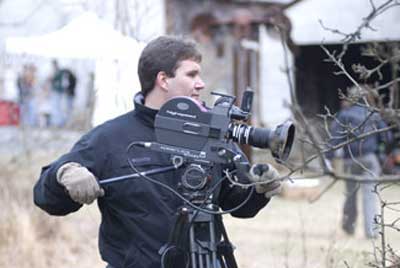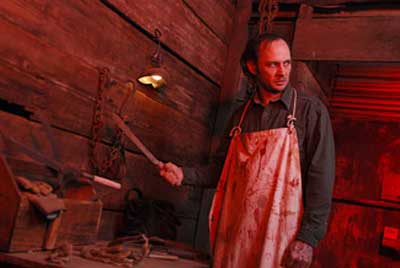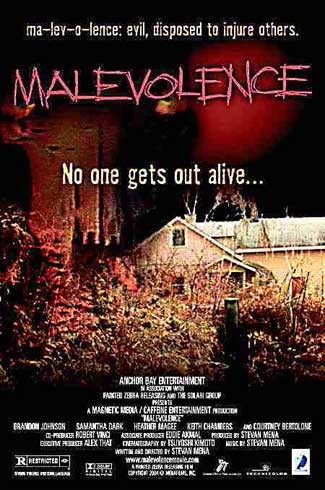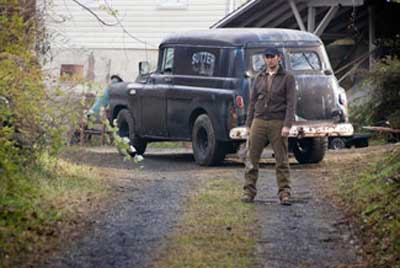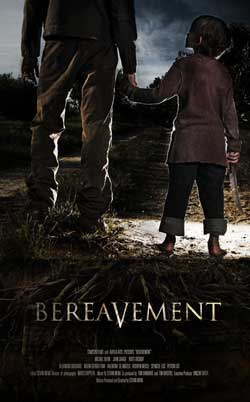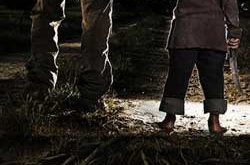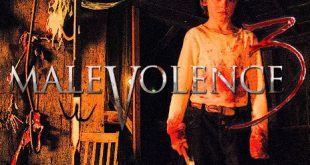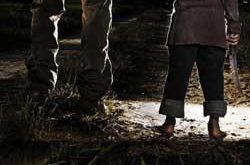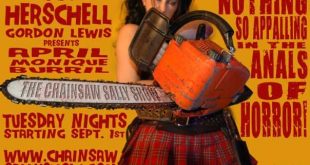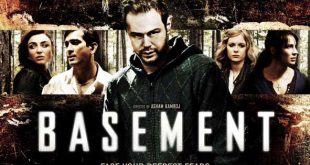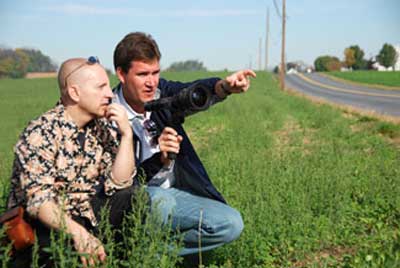 Sappy, sodden holidays to all of you! The Black Saint has returned from out of my mausoleum to regale you with an interview with a man who is sure to be a mover & a shaker in the future of Horror films. His name you ask? The man’s name is Stevan Mena & if you’ve been following my reviews you’ll know that I thought his “Bereavement” is one of the best if not the best horror film of the year. If you haven’t heard of it yet then by all means go into the archives here & read my review for this amazing movie. It soesn’t get an official release until next February but I was lucky enough to catch it at a screening earlier this year & was pretty much astounded at the bravery of the film & it’s filmmaker. It’s (as I said in my review) the new gold standard for psycho films in my estimable opinion. I know all of you will absolutely love it when it gets released so please run don’t walk to wherever it’s playing in your town once it arrives there. You’ll thank me later…
Sappy, sodden holidays to all of you! The Black Saint has returned from out of my mausoleum to regale you with an interview with a man who is sure to be a mover & a shaker in the future of Horror films. His name you ask? The man’s name is Stevan Mena & if you’ve been following my reviews you’ll know that I thought his “Bereavement” is one of the best if not the best horror film of the year. If you haven’t heard of it yet then by all means go into the archives here & read my review for this amazing movie. It soesn’t get an official release until next February but I was lucky enough to catch it at a screening earlier this year & was pretty much astounded at the bravery of the film & it’s filmmaker. It’s (as I said in my review) the new gold standard for psycho films in my estimable opinion. I know all of you will absolutely love it when it gets released so please run don’t walk to wherever it’s playing in your town once it arrives there. You’ll thank me later…
Luckily for all of you, Mr. Mena has agreed to a short interview to talk about his film & what got him into the horror business n the first place. It’s a pretty eye opening chat, Mr. Mena spares no words. The man knows what he wants & knows how to get it done…on budget no less! He is a budding genius & all of us should keep a close eye on the man & his career. He is going places, believe me. But enough from me…let’s listen to the man shall we?
The Black Saint: Thank you so much Mr. Mena for taking a little bit of your valuable time to talk to me & the readers of horrornews.net. Let’s get to my first question: According to your IMDB.com bio you started making films in your backyard in Long Island when you were eleven years old. Were they horror films? If they were horror films what were they about. Were your friends involved with you at the time?
Stevan Mena: They were “horrible” films, not necessarily horror. Unless you consider the “Killer Sneaker” or “People Pesticide” horror material. Many of my friends were involved. It kept us off of the streets, and was just for fun. But everyone grew out of it except for me. I became obsessed with filmmaking, every aspect of it.
TBS: Where did you study filmaking? Or did you just start by getting a job in the business & work your way up to directing from the bottom up? If you did attend school, which one was it & what did you get from your formal education that you use today when directing your movies?
SM: I have very little patience for structured learning, so no I could never attend film school. And having been making films all my life, I would have had trouble listening to anyone telling me how to make a movie. I learned by doing, watching others in the field, Making mistakes.
TBS: Your first full feature “Malevolence” garnered a lot of praise but attracted a lot of controversy as well. a lot of people felt it crossed some lines that shouldn’t have been crossed. How did you react to the praise & to the criticism? Did you take the criticism personally? Did you feel that you had to make your next feature “Brutal Massacre: A Comedy” to lighten things up a bit?
SM: I love reading bad reviews as well as good ones. Anyone who makes films and can’t handle bad reviews is in the wrong business. Bad reviews & good reviews are the same to me. They mean I affected the viewer. The only kind of criticism I hate is indifference. Reviews that simply tell you the plot and that it had a beginning, middle & end. I love to read WHY people LOVED it . Or WHY people HATED it. This is how you learn and grow. Art is meant to create a response. I take nothing personally. Like it or hate it, they still saw it. In the end, that’s all I want.
TBS: Sticking to “Malevolence” for a little while longer, it definitely had a 80’s slasher vibe to it. The (Kinda) cheesy soundtrack, the rural setting with a rundown house being the focal point for all of the action that took place & of course,,the hooded killer as well. Was all of this intentional? Were you making the film as a homage to 80’s slasher films or was this just the easiest kind of film to make as a first feature? By the way, I know you were responsible for the soundtrack & I meant the word “Cheesy” in the best possible way!
SM: It was very intentional. “Malevolence” was a love letter to my favorite slasher films. In the wake of so many bad slasher films being made, I wanted to remind people of why we like these films. So there were many stylistic homages in the movie. I wanted to recapture the vibe that had been missing. Scares and atmosphere, suspence. Not just weed, sex and waiting to be killed.
TBS: Was it always a plan to make a trilogy starting with “Malevolence” & continue with “Bereavement”? If so, do you have a script for the third film ready to go? or are you going to change up for your next effort & try something different?
SM: The trilogy is based on novel I wrote which I broke up into three sections. “Malevolence” was the middle part, “Bereavement” is the beginning, and so yes, the third is written and ready to go.
TBS: What did you learn from the making of “Malevolence” that you were able to utilize while making “Brutal Massacre” & “Bereavement”?
SM: I learned to interview my crew more closely, and try to avoid hiring evil mercenaries. I learned that it’s important to have your script in perfect shape before the camera rolls. And to never give money to strangers who claim to be PA’s working on the set. And to NEVER allow beer at craft services. And that in Pennsylvania, if you don’t return a U-Haul truck on time, you can be arrested!
TBS: I’ll keep those points in mind! Getting back to “Brutal Massacre”, was that an enjoyable experience for you coming off of the deadly seriousness of “Malevolence”? How did you like working with David “An American Werewolf In London” Naughton?
SM: The cast was amazing & we had fun every minute of the shoot. David took the role very seriously, he was a joy to work with. So was Brian “Clerks” O ‘Halloran, Ken “Dawn Of The Dead” Foree, Gerry Bednob, Vincent Butta & Gunnar “Leatherface” Hansen. There were no ego’s. That film was how making a movie should be. It was what I always expected it to be, everyone working together & enjoying the process. I think it shows when you watch the movie. I’ve never laughed so much.
TBS: Among the cameos in “Brutal Massacre” was a performance by a very good friend of mine, Tony Timpone, Editor Emeritus of FANGORIA magazine. He also happens to be a great individual & one of the truly “Good Guys” in the business. Were you (as I like to call us0 a FANGORIA baby? If you were, how did it feel to be working with Tony, who can legitimately claim to have launched quite a few careers in the horror industry?
SM: Not really, I read Fango as a kid, but I don’t normally like knowing what’s going on behind the scenes of movies. I like to pretend they’re real, especially horror movies. I want to get lost in the story. Once I’m aware of who is behind the mask, or how they actually cut that guy in half, the illusion is ruined for me. So I’m not an avid reader of horror magazines as much as I’m an avid fan of horror films. That being said, I became great friends with Tony & Michael Gingold over at FANGORIA & they are great guys!
TBS: I’ve noticed that in the scripts for both “Malevolence” & “Bereavement” that you really don’t mince words but the characters are fully fleshed out in spite of this. The audiences end up caring for the victims in both films (especially in “Bereavement”). Is this a conscious decision you make while writing your scripts or do they just end up this way because of your writing style?
SM: Actually, my writing style is very wordy, but a lot of that gets deducted in the editing room. I find I have much less patience for dialogue in the movie than I do in the script. Often the best way to tell the story, to move the scene is to get to the point. Sometimes the extra details are necessary. And viewers these days seem to have less and less patience. It’s a delicate balance on telling the story, but telling it with just enough. Less is often more. I actually learned a valuable lesson in editing from watching the “Behind The Scenes” feature on the dvd release of “Escape From New York”, which is one of my favorite films. Carpenter deleted an entire opening reel that explained the backstory of Snake’s crime and capture (for those who haven’t seen it…I’m not going to tell you what he’s talking about. See the movie with the deleted footage & learn)! I don’t know if I would have had the guts to do that. But it’s all about the movie as a whole, not how attached you are to a particular shot or piece of dialogue. The movie is king. I’m still finding my balance. And the more you care about the character, the more you will react when something happens to them, especially something bad or tragic.
TBS: How long do you usually take when writing your scripts from first draft to a final shooting script? And are you a director that sticks to the final script or do you mind some ad-libbing from your actors on occasion?
SM: My scripts often take years to write. But then some have taken months or weeks. It depends on the story and the style of picture. I don’t mind ad-libbing at all. But I’ve never done it. All of my scripts are xeroxed right onto the screen verbatim (so far). Every nuance is scripted, even gestures sometimes. However, I always allow my actors to decide what works for them when blocking a scene. Once you start robotically moving your actors around your scene, you’d better be a master like Hitchcock, or you will have trouble getting the performance to look real and not staged. The only scene in any of my films that was ever ad-libbed was the scene with Brian O’ Halloran talking about the script that his character was writing in “Brutal Massacre”. That was all his, done in one take at a bar & we ended up using it. But he has a razor sharp wit, and you’s be surprised how few actors can really pull that off.
TBS: Speaking of actors, you worked with one of my favorite actors on “Bereavement”..Michael Biehn. He is such an underrated actor in my opinion & he always seems to bring something different to every role he plays. Something that makes the role distinctly his. How did you feel when he agreed to appearing in your film & did you feel you had to change your directing style to accommodate him in any way since he was the “Biggest” actor you’ve ever worked with so far in your career? Were you in any way intimidated by him?
SM: I changed nothing. I was happy to have him on board but he was a piece of a very large puzzle. He was a very nice guy on set, very professional. He also had some great advice on several occasions. But although he is an intimidating presence, he was just one of the guys on the set. I really enjoyed working with him. And those who know me will tell you I’m a very stubborn person to work with, so it would take a lot to alter my style.
TBS: Michael Biehn aside, how do you work with actors in general? Are you an “Actor’s” director or are you more of a technical director who trusts his actors to hit their marks & know their lines?
SM: I’m an “Actor’s” director. My job is to monitor performance and make sure they are serving the story. I have full confidence in my actors, that’s why I hired them. So hitting marks is important, but getting the emotion and dialogue and interaction right is critical. I like to stand next to the camera near the action. I hate watching on a monitor. So I trust my DP to get what I asked him to get.
TBS: Do you enjoy composing music for your films? Where did you study music? Would you ever consider another composer to score one of your films or is that just something you just love to do?
SM: I love scoring music. I grew up listening to film scores so it’s a passion of mine. However I have worked with other composers. I hired several composers on “Bereavement”, but in the end, we just weren’t on the same page. It wasn’t their fault, they can’t read my mind, and I’m not intellectual enough about music theory to explain it to them. So I had to do it myself because I’m just too stubborn and picky about it. It’s extremely important to me and my vision of the finished picture.
TBS: The entire cast of “Bereavement” is a step up from the cast of “Malevolence” in terms of their experience. Was there a difference between working with the two casts? Were there any “Difference of opinions” issuse between you & any of the cast members in any of your films? If so, how were they resolved?
SM: I think the main difference was that more experienced actors take direction quicker and learned to trust the director, so they actually argue less than new actors. Brett Rickaby and I had words a few times on “Bereavement”, but it was a passionate debate about character and emotion. There are no right answers in art, so I welcome spirited discussions. I’d be much more upset about actors who showed up and didn’t care. Arguing your case about a scene or piece of dialogue proves to me you are invested in the quality of your work and the movie. So I’d be upset if they didn’t argue once in a while.
TBS: The (estimated) budget on “Bereavement” was $2 million dollars. Aside from the obvious, what was made easier for you by having this bigger budget? Did the bigger budget bring bigger expectations along with it or was it business as usual?
SM: More money never makes things easier. It only gets harder, and more difficult with more pressure. The benefit is not having to compromise as much on your vision. You can get that crane shot, or that car crash, or that special effect. So your vision is more realized. That doesn’t mean it’s better. Often a lack of money forces you to be more creative. Throwing money at something rarely increases your creativity. Often it stifles it. But if I had to choose, I prefer to have the money!
TBS: You mentioned earlier a few occasions where you and actor Brett Rickaby had “Words” during the filming of “Bereavement”. I for one found him to be EXTREMELY effective in the role of Graham Sutter. He really hit the nail on the head with his performance. After the screening of the film, the other actors who participated in the Q & A with you made mention of the fact that he stayed in character throughout much of the filming & although he seemed to be a nice enough fellow on stage, I still felt a bit unnerved being so close to him. How did you feel working with him while making the movie & did he stay in character during your interactions with him?
SM: Brett has a eerie way of holding a conversation where he can smile at you and you smile back, but he keeps smiling. And by doing this, you start to wonder if there is any hidden meaning in what he just said, or if there is some other subtext he was implying. But he nods and smiles, and you’re like “What the hell is this guy smiling about”? “What the heck is wrong with this guy? Maybe he really is crazy”? And then he laughs and the conversation continues, but you’re like..”What’s up with this guy”? But then you get to know him and you find that he is the nicest guy you’ve ever met. And very deep & interesting. Our conversations are always engaging, and Brett seems like one of those people that just never gets boring. This movie couldn’t have been finished without his help. There were times he would even help move lights…a real team player. And his performance to me is the greatest thing I’ve ever been a part of.
TBS: I would be remiss if I didn’t mention young Spencer & Peyton List. A real life brother and sister that play different roles in the film. The two characters share one very intense scene together that raised my eyebrows. How did that scene come together & although their parents (obviously) knew what the script asked of their children, did they ever ask if the scene could be toned down a bit? Were the kids a little more tense on the day this scene was filmed?
SM: Spencer was a real trip, unusually focused for a nine year old. And his sister was a pure joy. Peyton lights up the room. Spencer was a gamer, and never complained. And when the cameras rolled, he was on. In fact, I’d say he was the most prepared of all of the actors on the set!
TBS: Alexandra Daddario played Allison, Michael Biehn’s niece in the film & she was spectacular in the role. Was she ever uncomfortable during filming any of her scenes? Especially the scenes she played in the freezer (which were apparently on while she was in there). And is it just me or is she more beautiful in person than on the big screen? I’ve met more than a few actors in my time and I truly believe that she was the only one who was more beautiful in person than she was on screen. As a matter of fact her beauty is nearly heart stopping in person! Her role was also a physically challenging one. Did she have any problems with all that she had to do during the film?
SM: Alex was only uncomfortable once, during a scene that required a lot of makeup. We had wrapped on the exhausting scene, and then I told her we had to do it again. That wasn’t fun. But she never complained once, and that’s amazing considering what we put her through. And yes, she is even more beautiful in person. It’s almost unfair how much good stuff is in her gene pool. And regarding physicality, she had several very demanding scenes that actually required great physical strength, but she pulled it off. She is amazing. Based on her meteoric ascent to stardom, I’m not the only one who thinks so.
TBS: Esteemed character actor John Savage has a small but pivotal role in the film & his final scene is heart rending. How was it directing him & what, if anything, did he add to his character that wasn’t in the script?
SM: John was a firecracker on set. He kept everyone on their toes. He likes to surprise his co-stars by changing up dialogue or just twisting things to get a different response. He knows what works and what doesn’t, and if you blink you’ll miss something. I found that often I would get left behind and would have to search my pages to find out what he was doing exactly.
TBS: The MPAA denied you the use of the first poster image of “Bereavement” because of the image of a child holding a weapon. How did this effect you on a personal 7 professional level? What changes did you have to make to satisfy the bastards? And are you ultimately happy with the poster image the MPAA finally accepted? Do you think that if the film had a bigger budget or was being distributed by a bigger company that the MPAA might have allowed the original image to be used?
SM: The MPAA has a thankless job. And I think what they do is important. They have to look at things from many angles. And sometimes it’s hard to view things from an obtuse perspective. But they have to render judgment on artistic expression, and that’s always going to rub the artist the wrong way. But art can and does influence. I’d feel terrible if young children imitated my artwork and began walking around with kitchen knives, you never know…someone could lose an eye.
TBS: I like to end my interviews with the same question. What is your favorite film? Horror or not? And why is it your favorite film?
SM: My favorite film of all time is “12 Angry Men”. It encapsulates everything that is great about movies, about the human race. It’s the perect movie. If Aliens came down to Earth long after we destroy ourselves and find only one trace of our existence, I hope it’s a copy of “12 Angry Men”.
TBS: OK, so what’s your favorite horror film?
SM: My favorite horror film is “The Texas Chainsaw Massacre” (1974). It’s a nightmare on film. A miracle. Truly the most terrifying experience ever committed to film. Nothing will ever top it’s ferocity.
TBS: I lied, I have one more question for you. Who are your greatest influences? Whose films inspired you to get into filmmaking & how do you see your career playing out in the long run?
SM: My greatest influences are John Carpenter & Ridley Scott. I’m also a giant fan of John Williams. Lately I’ve also become a fan of Clint Eastwood’s directorial efforts as well. As to my career, no one can really see how their careers will develop. I can only hope that I can go on making films that I want to make.
TBS: Mr. Mena, you’ve been nothing but a prince for answering these questions & I’m sure that everyone reading this will see “Bereavement” (They better….I said so). And I anxiously await your next directorial effort, whatever genre it happens to be in. Thank you so much for your time.
SM: You’re very welcome, thank you!
 Horror News | HNN Official Site | Horror Movies,Trailers, Reviews
Horror News | HNN Official Site | Horror Movies,Trailers, Reviews
